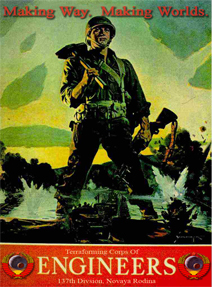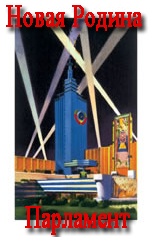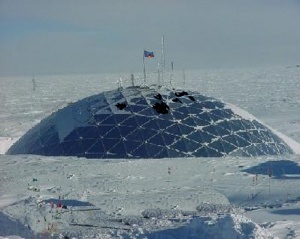Meadow
A Brief History[edit]
(Excerpts below taken from The Complete Atlas of the 'Verse, 2515 edition, by Parliamentary Press Publishers, Londinium Prime, Londinium.)
Called Novaya Rodina (New Motherland) by its Russian inhabitants despite its renaming by the Celestine Cartographical Nomenclature Uniformity Act of Parliament of 2311, Meadow was terraformed and settled in the early years soon after the Exodus. The 'Verse offered people from Earth That Was a unique opportunity to claim entire worlds for the exclusive use of individual cultures or people. As the superpowers from the Pre-Exodus days colonized the two biggest worlds in the Core in an echo of the geopolitical situation on ETW, the lesser powers--smaller but no less important in the mass Exodus effort--also laid claim to a world or two as befitting their role as back-up players in the Exodus enterprise. The Russians, being a superpower in their own corner of Earth That Was and accustomed to sovereign autonomy, left the Core to terraform a New Russia as soon as it was possible to do so.
The Russians, however, were hampered by their cultural tendency to more authoritarian rule and a talent for getting stuck with the not-quite-right, and though they settled their world and it was as remote as they wished, the terraforming wasn't as successful as hoped due to the Russians insistance that it be done *their* way, following their business model, using their incentive system. During the period of unregulated expansion after Landing, Novaya Rodina, like many of the lesser worlds, got bypassed or overlooked by the centralized powers of the Core. Certainly by the time the Alliance consolidated its resources and political will and began providing services and benefits as a benevelent superpower to the other worlds outside its boundaries, Novaya Rodina had managed to stabilize its environment and develop its industry independently of extraterrestrial aid, and from that position refused Alliance help. And so Novaya Rodina grew into an even more insular and tightly-knit homogeneous society and culture.
This insistance on cultural and political isolation continued until a combination of industrial disasters, the subsequent economic crash caused by disasters, and the crippling effect of an "arm's race" in colonization brought Novaya Rodina's native government to the brink of collapse and it was only through the efforts of a daring backbencher of its Diet to bring the world's plight to the attention of Parliament that Novaya Rodina was saved from ruin. Emergency relief in the form of monies and human and technical resources poured in over the next two years and as a stipulation for the aid, the Alliance negotiated from Novaya Rodina a client-state treaty that included a 200-year lease on a La Grange point in orbit dedicated to an Alliance military platform and an Alliance-appointed Governor with plenipotentiary powers over the Novaya Rodinan Diet, with the agreement that the Client status and Governorship may be dissolved upon the native government regaining its ability to execute its duties in a sustainable and equitable manner. The installation of the Governor was a highly contested point of the treaty, but objections were overruled by a sizable margin as the Diet voted in favor of getting the aid necessary to repair the damage wrought by the disasters and to restore stability to the economy and society at large.
In the decades since the treaty, Meadow has repaired most of the damage dealt it and can claim to have restored 85% of the industrial infrastructure it lost. Experts predict another 7% need never be recovered as new, more efficient practices and facilities are implemented in the place of the old. Unemployment, alcoholism, domestic abuse, and petty crime have been significantly reduced in the areas hardest hit, and conditions have improved quantifiably elsewhere. Most attribute the improvements to Alliance financial aid and the institution of standard Alliance practices of universal health care and employment benefits.
Despite the demonstrable advantages of Alliance clientship, several Acts instituted in obedience to Unification, including universal mandatory education of Mandarin and English in schools over the native Russian tongue, as well as the renaming of Novaya Rodina as per the Celestine Nomenclature Uniformity Act, have engendered much ill-feeling toward the Alliance amongst the native populace. As a result, there is a growing political pressure for the dissolution of the Governor's appointment and the reinstatement of full autonomy to the Novaya Rodina government. Negotiations are ongoing, pending final verdict as to Meadow's ability to function independently of Alliance assistance.
(Of course, if you ask the natives of Novaya Rodina about their planet's history, their version of the story is different. A lot different.--Ed
Natural Resources and Industry[edit]
Meadow is blessed with expansive rolling steppes and forested taiga, several sizeable oceans and some truly spectacular mountain ranges. The original inhabitants chose well toward their goal of recreating as closely as possible their beloved country on Earth That Was. Even the climate engineers have managed to reproduce the weather conditions of the Russian ancestral home. Winters are harsh over much of Meadow, with snow and ice lasting over seven months of the year. Summers are brief and vibrant. Spring and Autumn are milder and wetter. The mean temperatures throughout the year, however, tend toward the cold end of the thermometer, given Meadow's distance from the system's star.
Forestry is a valuable source of revenue on Meadow, with wood and wood pulp products sustaining a large section of the overall economy. Everything from construction lumber to furniture to paper to art objects are manufactured from Meadow's vast forests of broadleaf hardwoods and and coniferous softwoods. Currently little is exported off Meadow, as production is barely meeting domestic demand. Off-world developers have so far been discouraged from large-scale investments in the industry by Meadow's inhabitants, with preference given to native developers instead. br>
The soil is rich and black, with a fair amount of volcanic material, evidence of the planet's geological heritage although current volcanic activity is confined to a relatively small total area of the planet's surface. As a consequence, most of the arable land area of Meadow is optimal for growing food crops and as pasturage for livestock. Grain such as wheat, corn, buckwheat and barley are the mainstays of the domestic grain market, while beef and bison dominate the meat market. A smaller percentage of sheep, pig, goat and poultry round out the total of meat raised on Meadow. Despite near-perfect conditions for grain and livestock production, Meadow's surplus for off-world trade is slim. Inefficient harvesting technology and distribution systems have handicapped the development of Meadow's potential as the breadbasket world for the Georgia system. Improvements are underway but are progressing slowly as the inhabitants overcome their distrust for newer, off-world methods.
Despite its picturesque name, Meadow has large areas designated as industrial zones, devoted to heavy industry of various types. Regulation of toxic materials is not as meticulous as in the Core. As a result a good percentage of the environment immediately surrounding such zones is contaminated. Ore mining and refining, oil/fuel wells and refineries, metal foundries, plastics and electronics production have all made their mark on the planet. Studies are not yet conclusive, but there is reasonable cause to suspect that toxic pollution is responsible for the high incidence of medical problems amongst the populace in the more highly concentrated areas of industry, including cancer, birth defects and chronic pulmonary diseases.
Power for Meadow is largely provided by nuclear plants and it was the combination of one of these going critical amidst the primary oil refinery facility of the planet that touched off the string of events that necessitated Alliance intervention. As stated elsewhere, the industrial and domestic infrastructure damaged by those events have been largely replaced and in some cases improved through Alliance intervention and aid. After years of unceasing labor, Meadow is finally emerging from the aftereffects of the disasters and it is hoped it will not be long before the planet can realize its full potential, taking its rightful place as one of the more valuable and productive planets of the Georgia System.
Cерый Oгонь ГУЛаг[edit]
Cерый Oгонь ГУЛаг (Seryi Ogon - Gray Fire GULag) - A titanium mine converted into a work camp. The domed strip mine has suffered considerable damage (many of the glass panes in the dome are broken) and systems throughout the prison are non-functional. The Gulag continues to produce titanium which was traded to regional use. Since the Long Quiet, the Gulag has continued to produce titanium and trade it for supplies and food with regional dealers.
Notes[edit]
- The GULag was taken over by prisoners a few months after it lost government support.
- Summer's Gift crash landed near the GULag in Episode 419, and its crew were rescued by its leaders in Episode 420.
- Summer 2522 - Three new classes of vessels launched from the Naval shipworks on Mir.
- Balosch [палаш] (Broadsword) class 15,000 ton armored cruiser. Built off the Rudner class freighter.
- Lacoise (лосось] (Salmon) class 3,000 ton patrol ship. A new design, built from scratch.
- Zhar-Ptecha (жар-птица) (Firebird) class 1,000 ton fast escort. Built off an Alliance prototype developed in the U-War but never put into production.



